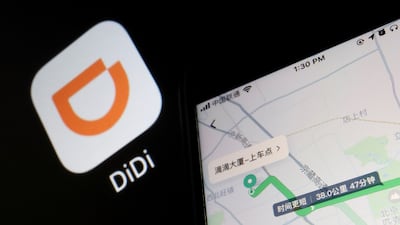Didi Global's shares fell more than 10 per cent in New York on Friday, after China's cyber space agency said it had launched an investigation into the Chinese ride-hailing giant to protect national security and the public interest.
The Cyberspace Administration of China (CAC) said on its website that Didi was not allowed to register new users during its investigation, which was announced just two days after Didi began trading on the New York Stock Exchange.
Beijing-based Didi said in a statement to Reuters that it planned to conduct a comprehensive examination of cyber security risks and would co-operate fully with the relevant government authority.
In a filing, it said that apart from the suspension of new user registrations in China, it was operating normally.
Chinese internet regulators have tightened rules for the country's tech giants in recent years, asking companies to collect, store and handle key data properly.
The cyber space agency did not offer details about its investigation into Didi, but said the investigation was also to prevent data security-related risks, citing China's national security law and cyber security law.
Didi, which offers a wide range of services in China and over 15 international markets, gathers vast amounts of real-time mobility data every day. It uses some of the data for autonomous driving technologies and traffic analysis.
Didi laid out related regulations in China in its IPO prospectus and said: "We follow strict procedures in collecting, transmitting, storing and using user data pursuant to our data security and privacy policies."
Two investors, however, told Reuters that company executives did not discuss possible cyber security regulation with investors at the call they joined for Didi's IPO roadshow.
Didi's shares fell as much as 10.9 per cent after the open and closed 5.3 per cent down.
"Didi does seem to be attracting a lot of regulatory pressure. The near-term impact depends a lot on how long a review lasts but Didi has a large enough base that we aren't going to change our forecasts yet," Redex Research analyst Kirk Boodry, who publishes on Smartkarma, told Reuters.
Adam Segal, a cyber security expert at the Council on Foreign Relations think tank in New York, said while it was hard to know what was going on without more detail, "CAC has been looking at security of all large firms' data as part of a crackdown on big tech".
Didi, which raised $4.4 billion from its initial public offering (IPO), did not hold a celebration event for its market debut, an unusual move among Chinese companies.
The company, founded by Will Cheng in 2012, has faced several regulatory probes in China over safety and its operation licence.
The company is also facing an antitrust investigation, revealed by Reuters in June, looking at whether Didi used anti-competitive behaviours to drive out smaller rivals. It said at the time that it would not comment on "unsubstantiated speculation from unnamed source(s)".
Didi's debut on Wednesday was the biggest US listing by a Chinese company since Alibaba Group Holding in 2014.
It had aimed to raise up to $10bn through its IPO to value the company at $100bn. However, investors were critical of the valuation target during meetings ahead of the deal's launch which pushed its size down.
Didi is also backed by technology investment giants including SoftBank Group, Alibaba, Tencent and Uber.

